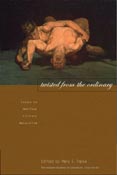Twisted from the Ordinary
Essays on American Literary Naturalism

- Author(s): Papke, Mary E.
- Series: Tenn Studies Literature
- Imprint: Univ Tennessee Press
- Publication Date: 2003-06-05
- Status: Active
- Available in Hardcover - Cloth: Price $42.00 | Buy Now
- Leaf eReader required for PDF ebooks
American literary naturalism both seduces and repulses the reader, disrupting stable notions of individual and moral coherence. Usually associated with works such as Frank Norris’s McTeague and Stephen Crane’s “The Open Boat,” naturalism draws on nineteenth-century theories of hereditary and environmental determinism, emphasizing the role of chance in characters’ struggles for survival in an increasingly industrial, capitalistic, urban jungle.
The essays in this volume revise the canon of naturalism, looking beyond the classic period of the 1890s to uncover naturalistic tendencies already at work in such mid-nineteenth-century authors as Rebecca Harding Davis and Elizabeth Stuart Phelps and to elucidate the naturalistic themes exploited more recently by postmodern authors such as Raymond Carver and Don DeLillo. While canonical figures—Norris, Crane, Jack London, Theodore Dreiser, and Edith Wharton—are represented, the approaches to these authors’ works are innovative, appealing to concepts as diverse as Foucault’s clinical gaze, the perversion of the gift economy, the rapacious competition implicit in the acquisition of cultural capital, the erasure of racial difference from the urban landscape, and the moral critique of individual freedom. Other essays deal with writers not primarily identified with naturalism, including Henry James, whose treatment of human agency is also central to early modernism, and Jane Addams, whose explicit moralism lays bare naturalism’s often hidden reform agenda.
A stimulating, unique collection, Twisted from the Ordinary tests the generic boundaries of American literary naturalism and shows its ongoing relevance in understanding a broad set of themes, ranging from Victorian sentimentalism and the overdetermination of violence in true-crime novels to the ethical implications of recent scientific research and the social forces shaping selfhood in the twenty-first century.
The Editor: Mary E. Papke is an associate professor and director of graduate studies in the English Department at the University of Tennessee. She is the author of Verging on the Abyss: The Social Fiction of Kate Chopin and Edith Wharton and Susan Glaspell: A Research and Production Sourcebook.
Contributors: Donna M. Campbell, Brannon W. Costello, William Dow, Robert M. Dowling, Tim Edwards, Lilian R. Furst, Philip Gerber, James R. Giles, Sara Britton Goodling, Laura Hapke, David K. Heckerl, Barbara Hochman, Hildegard Hoeller, Katherine Joslin, Kecia Driver McBride, Mary E. Papke, Donald Pizer, Daniel Schierenbeck, Nancy Von Rosk, Lana A. Whited, Adam H. Wood, and Mohamed Zayani.
